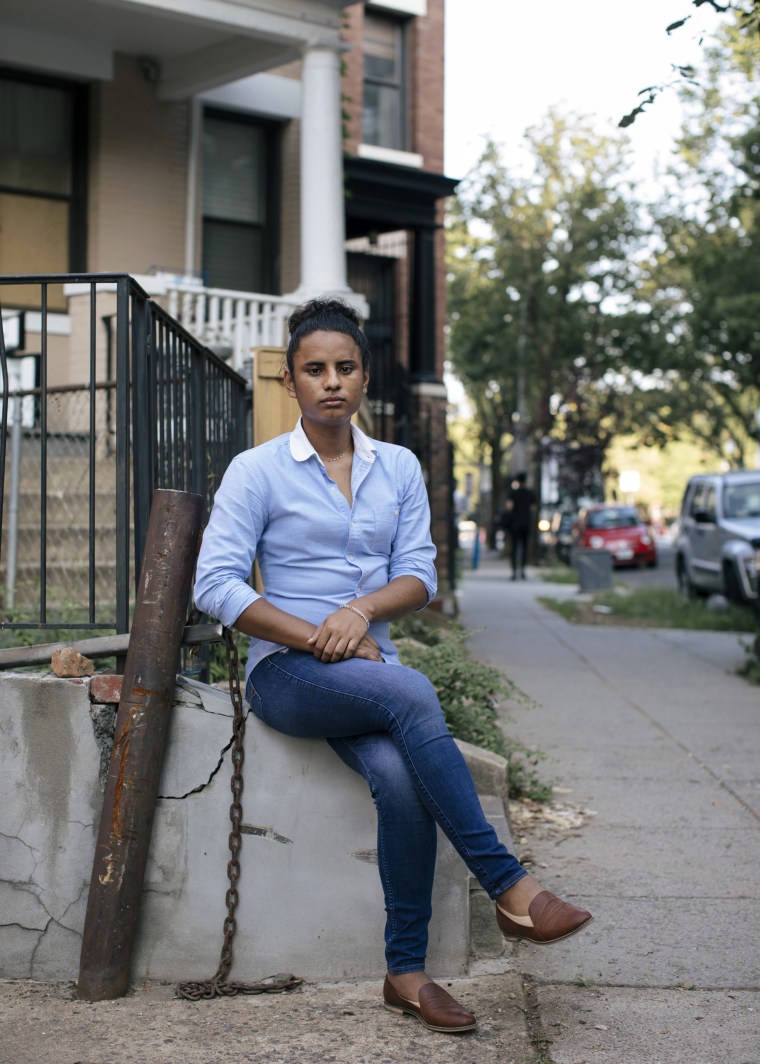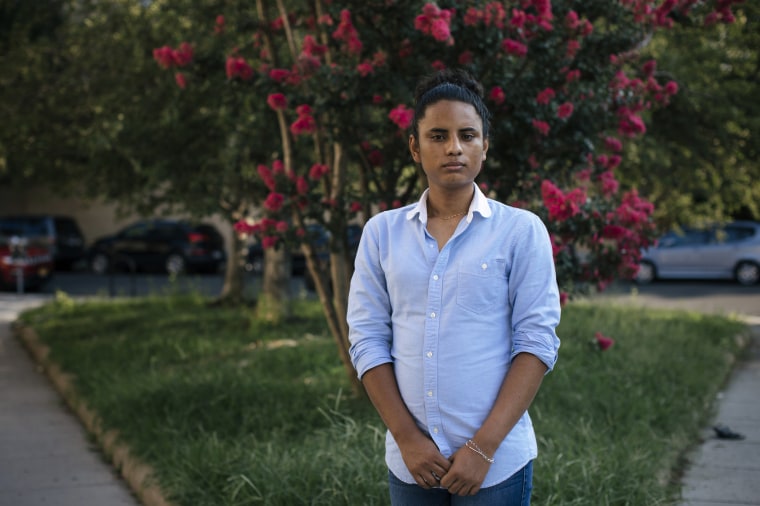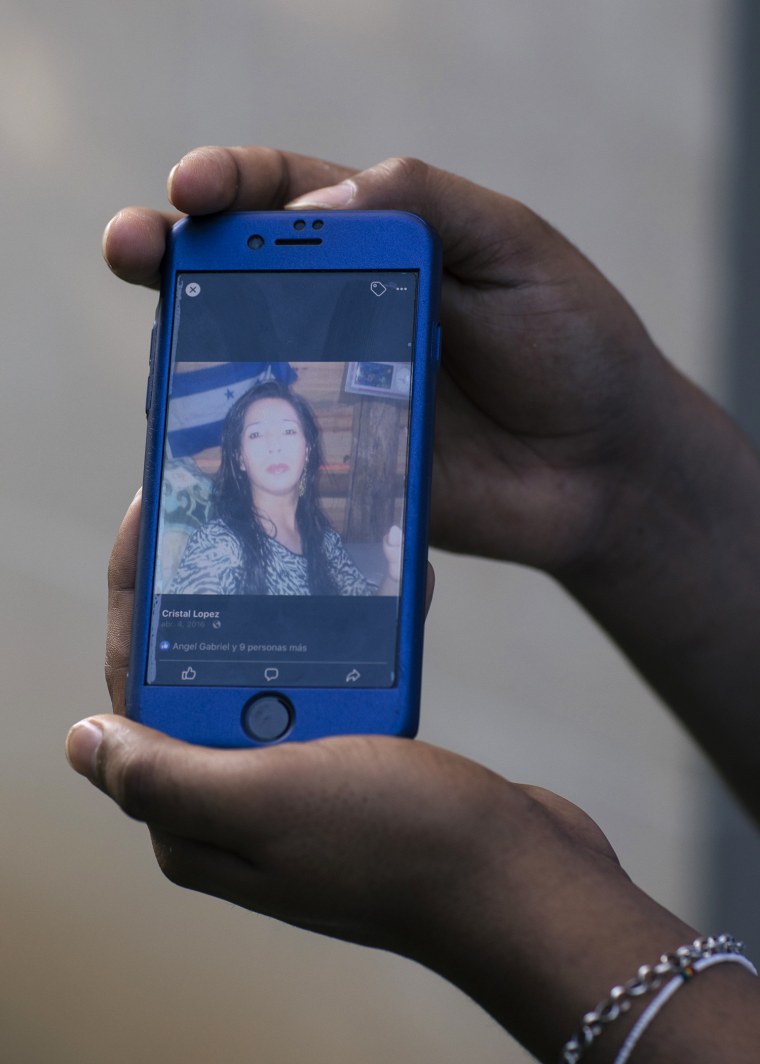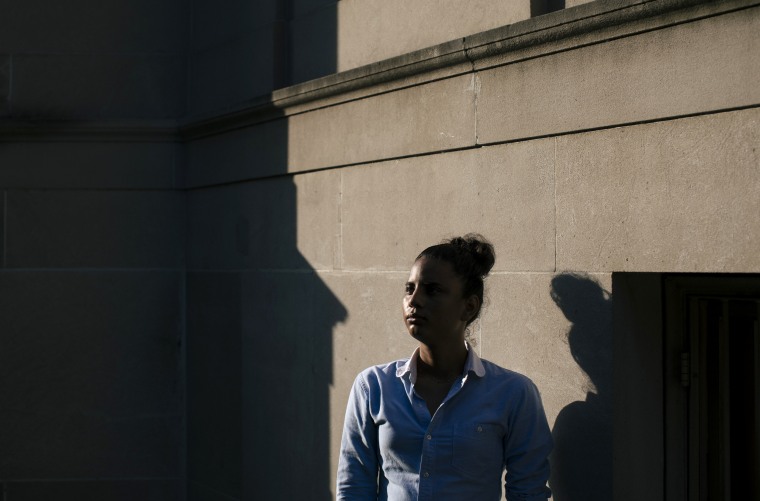Marivian Muñoz, a transgender woman, was 14 when she first fell in love. His name was Roniel, and they went out secretly for a year. It was hard to be openly LGBTQ in La Ceiba, a seaside city on the northern coast of Honduras.
A year later, Roniel — just 19 — was murdered by Mara 18, also known as the 18th Street Gang, a violent transnational group. Muñoz suspects Roniel was killed because of his sexuality, but the crime was never solved.
"The gang members went into his house and shot him, leaving him stretched out in the living room," Muñoz wrote in her March 2018 asylum application. "I never had a serious relationship again."
The loss of her first love was harder to take because Muñoz had no security at home. She said she was brought up in an abusive environment where no one — not family, not friends, certainly not the government — could be trusted to provide safety.
In over a dozen pages of her asylum deposition, Muñoz, now 24, recounted how, starting from when she was a teen, she was verbally and physically abused by family and peers, even being raped multiple times. Muñoz left Honduras on Dec. 27, 2017, and traveled overland for 55 days. She won her asylum case in June 2018.
Muñoz is one of at least 4,385 people who have sought asylum in the U.S. since 2007 through a claim of anti-LGBTQ persecution in their home country, according to exclusive data obtained by NBC News through a Freedom of Information Act request to United States Citizenship and Immigration Services.

"Walking on the streets in Honduras is a veritable hell for me, since I have to tolerate sexual harassment, insults, taunts, and violent acts by people who think they have the right to impose their anti-LGBTI ideas on me," Muñoz wrote in her asylum application. "I came to the United States because it is a symbol of freedom. Here, I will be able to be the woman I want to be, without the constant fear of being killed or attacked."
Immigration advocates, however, are warning that the days of America being a beacon of hope for those fleeing homophobia and transphobia abroad could soon be over.
'The death of asylum'
On June 15, the Trump administration unveiled "Procedures for Asylum and Withholding of Removal; Credible Fear and Reasonable Fear Review," a proposed overhaul of the rules that govern the intake of asylum-seekers at U.S. borders and ports of entry.
If approved as proposed, the rules would radically alter the American asylum system by making it harder to both enter the U.S. to seek protection and to win a gender-based claim in its immigration courts. Experts say the rules would empower officials in immigration courts and at the U.S. border to disqualify migrants from ever having their day in court.
In a comment filed against the proposal, Human Rights Watch wrote that the regulations "appear designed" to target three groups in particular: "Central Americans fleeing gang violence; women fleeing domestic abuse; and lesbian, gay, bisexual and transgender (LGBT) people."
Aaron Reichlin-Melnick, policy counsel at the American Immigration Council, a pro-immigrant rights group based in Washington, said "these proposals are accurately described as representing the death of asylum."
"They would drastically raise the standards for people to win protection and raise the screening process for asylum at the border to a heightened level that would make it very hard for people to ever get the chance to formally apply for asylum."
Reichlin-Melnick said what is clear is that if approved, the new rules would "have a dramatic effect on people with strong asylum claims, which covers many LGBTQ asylum-seekers."
In an email, Victoria A. Palmer, a United States Citizenship and Immigration Services spokesperson, wrote "nothing has been finalized."
"DHS and DOJ are now conducting a review and analysis of comments and will then issue a final rule. The date of the final rule has not been determined," Palmer said.
The Department of Justice, which contains the Executive Office for Immigration Review, declined to comment.
LGBTQ immigration advocates like Katie Sgarro, co-founder and president of AsylumConnect, a digital platform where LGBTQ asylum-seekers can find resources to help pursue their claims, said if enacted as proposed, the rules would eliminate many of the legal avenues for textbook gender-based asylum claims.
"If you had an LGBTQ rights advocate who came to the U.S. after courageously advocating for LGBTQ equality or helping LGBTQ community members in their home country where it's extremely dangerous to be openly gay, that person would qualify for immediate deportation," Sgarro said.
Lee Gelernt, deputy director of the ACLU's Immigrant Rights Project, said the proposal to restrict a variety of legal avenues for asylum claims was just one part of the Trump administration's effort to create more roadblocks to all immigration, even as pandemic-related border restrictions and the "remain in Mexico" policy have for the past year stopped many asylum-seekers from ever crossing into the U.S.
"The asylum statute that Congress enacted allows asylum claims based on gender and sexual orientation, and the Trump administration is now trying to overturn years of considered case law by enacting regulations," Gelernt said. "The regulations, if not changed, will be challenged immediately in court because they are inconsistent with the asylum statutes and the case law properly interpreting those statutes."
America's history with LGBTQ asylum-seekers
For decades, America was an unwelcoming place for people fleeing anti-LGBTQ persecution. The Immigration and Nationality Act of 1951 barred admission of aliens with "a mental defect," and a 1965 amendment to the act made Congress' intention clearer by adding "sexual deviation" as a medical bar to entry. Plus, homosexuality was considered a mental illness by American psychiatric manuals until 1973.
In 1980, then-President Jimmy Carter signed the Refugee Act, which defined "refugee" as someone who was outside of their home country and was "unable or unwilling to avail himself or herself of the protection of that country because of persecution or a well-founded fear of persecution on account of race, religion, nationality, membership in a particular social group, or political opinion."
An asylum-seeker is largely the same as a refugee, but the main difference is when they ask for refuge: Refugees apply before they arrive in their destination country, while asylum-seekers apply after they arrive.
Since the Refugee Act of 1980 did not define what counted as a "particular social group," immigration judges were soon called upon to adjudicate.

By 1985, the Board of Immigration Appeals issued the precedent-setting "Matter of Acosta," a ruling that began to define "a particular social group" as one whose members must all share a characteristic that they cannot or should not be required to change.
"The shared characteristic might be an innate one such as sex, color, or kinship ties, or in some circumstances it might be a shared past experience such as former military leadership or land ownership," the Matter of Acosta read.
The inclusion of that single word — "sex" — and an evolving legal and cultural understanding of what someone "cannot or should not be required to change" led to a series of pro-LGBTQ immigration rulings.
In 1994, Attorney General Janet Reno directed authorities to consider as precedent the Matter of Toboso-Alfonso, a 1990 decision that found that a Cuban gay man targeted for his sexuality qualified for asylum as a member of a "particular social group."
Then in 2000, an awkwardly worded federal appeals court ruling began to extend similar rights to claims based on gender identity — all based on the Matter of Acosta's inclusion of the word "sex".
Tracking LGBTQ asylum-seekers
By 1997, three years after Reno's directive made Toboso-Alfonso the standard, OutRight Action International (known then as the International Gay and Lesbian Human Rights Commission) estimated that over 100 people had by then applied for asylum in the U.S. based on a claim that they were persecuted because of their sexuality.
Since then, the U.S. government has released little, if any, data to the public about the number of LGBTQ asylum-seekers in the U.S.
Through a Freedom of Information Act request NBC News has obtained data on LGBTQ people who sought asylum in the United States for a decade spanning the Obama administration and a small portion of the George W. Bush and Trump administrations.
The exclusive U.S. Citizenship and Immigration Services data shows the number and countries of origin of 4,385 LGBTQ asylum-seekers who entered the United States from January 2007 to November 2017. LGBTQ asylum requests peaked in December 2016 and then subsided.
These LGBTQ asylum-seekers came from countries around the world — China, India, Russia, Brazil — but from 2007 to 2017 the largest share per capita came from Central America's "Northern Triangle": Honduras, Guatemala and El Salvador, three countries with high homicide rates that have in recent years sent thousands of migrants and dozens of caravans toward the U.S. border.
By comparing these figures to overall asylum figures contained within the Citizenship and Immigration Services' Asylum Division Quarterly Stakeholder reports, NBC News found that about 1 in 12 U.S. asylum requests from Hondurans came from those who said they had a fear of persecution because of their membership in a "particular social group" — the LGBTQ community.
Of all the asylum-seekers who presented at U.S. ports of entry with a claim of LGBTQ-related persecution, immigration officials rejected just 2 percent, finding that they had "no fear" of persecution. (These credible fear and reasonable fear interviews are typically the first step in the asylum process, but they do not necessarily mark the end of all legal recourse for an asylum-seeker.)
Reichlin-Melnick said this 98 percent approval rate for the credible fear and reasonable fear interviews of LGBTQ asylum-seekers is "significantly higher than everyone else," estimating that the general population passage rate has generally fallen from 75 to 90 percent.
'A really hard blow'
Muñoz said she's grateful that she won her asylum case before Trump's restrictions came into effect. She now lives and studies English in Washington, D.C., and hopes to enroll in college soon.
"I think the USA gives me the assurance that at least I won't get killed for being LGBTQ," Muñoz told NBC News. "Although there are radical groups, they don't damage minorities as much as they do in Honduras."
That doesn't mean the violence she fled still can't touch her. In late July, Muñoz said she felt "destroyed" after receiving the news that her best friend of 14 years, Cristal López, another trans woman, was killed in Honduras alongside her partner.

"She always felt really unsafe in Honduras," Muñoz said of her friend, whom she long ago gave up trying to persuade to emigrate to the U.S. That's because López had a dream — she wanted to open a bar in La Ceiba.
Muñoz said that just a week before López was killed, she had helped her buy the land. "According to our plans, she was set to have everything done and to be in charge of the bar by May of next year," Muñoz said.
Muñoz said she spoke to López every week, including just hours before her death. "Really, it's been a hard blow," Muñoz said.
But sharing her friend's story is important to her. "Maybe this way we can find justice."
She said her best friend's slaying inspired a change of career. Before López's death, Muñoz wanted to be a nurse. Now, she wants to be a prosecutor so she can advocate for victims of violence.
"I think this has given me the strength," said Muñoz, "to fight for people who are killed like this."

